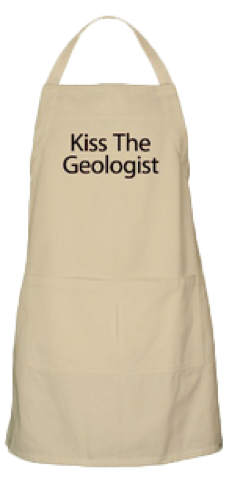A Free Earth Science Video Resource for Educators!
A Free Earth Science Video Resource for Educators!

Free Videos

Lesson Planning Ideas

Experiments
Episodes
-

Pilot Episode: The Three Types of Rocks
Geologist Devin Dennie heads to the kitchen to demonstrate the differences between the three types of rocks.
-

01. What is a Mineral?
Episode 1 introduces mineral properties using common fruit and vegetables as analogies for these five descriptive criteria. The video also demonstrates the orderly crystalline structure of halite (NaCl) using a model made of food (marshmallows and grapes).
-

02. Mineral Properties
Episode 2 expands on the mineral concept by discussing the characteristics of minerals used in mineral identification. Fruit are again used to describe these elementary criteria and relate to the discussion on how minerals are categorized.
-

03. Clastic Sedimentary Rocks
Episode 3 gives a brief description of the sedimentary rock cycle from weathering and erosion, to sediment transport, to deposition in a basement and final burial and compaction.
-

04. Metamorphism
This episode explores the concepts of regional versus contact metamorphism. Heat and pressure are discussed and their roles in changing various rock types into metamorphic rock varieties.
-

05. Chemical & Biological Sedimentary Rocks
Chemical and biological sedimentary rocks are discussed in this video. Carbonates, including limestones and dolomites are discussed, and cave stalactites are made.
-

06. Weathering
Weathering concepts are visualized for both physical and chemical weathering processes. Freeze-thaw cycles and water action are discussed using kitchen experiments, as well as wind abrasion.
-

07. Mineral Formation
Mineral formation through hydrothermal and magmatic processes is discussed using cotton candy machine as a visualization experiment.
-

08. Layers of the Earth
Devin whips up a model of the layers of the earth using ingredients from the kitchen.
-

09. Plate Tectonics
This episode discusses the scientific theory of plate tectonics, in which the Earth's crust is subdivided into a series of large and small tectonic plates.
-

10. Volcanoes
This episode demonstrates how the release of gas is an importance factor in the violence of a volcanic eruption through the classic baking soda-vinegar volcano, and a more modern analog with diet soft drinks.
-

11. Igneous Rocks
Igneous rocks are rocks derived from the cooling of magma, molten material originating from the upper Mantle/lower crust. Igneous rocks are classified by their texture and their composition.
-

12. Oil in the Kitchen
This episode introduces the concept of hydrocarbons (oil). A simulation of an oil reservoir is performed using peanuts and concepts of oil/water interaction are discussed.
-

13. Feldsparty
Feldspars are the second most common group of minerals on Earth. The are important contributors to soils as they weather relatively easily to form clays.
-

14. Mineral Formation Methods
Devin takes a look at a few of the methods of mineral formation
-

15. Divergent Plate Tart
Devin whips up a giant toaster pastry to demonstrate a divergent plate boundary
-

16. Turner Falls
Devin makes a unique type of cake to demonstrate a unique type of waterfall
-

17. Rock Stress & Strain
Devin uses potato chips and taffy to demonstrate how some rocks react under stress and strain.
-

18. Molds & Casts
Devin demonstrates how fossil casts are made by using Jell-O and a white chocolate dinosaur
-

19. Convergent Plate Boundaries
Devin uses pizza dough and hard tack to describe what happens when to tectonic plates meet
-

20. Geologic Time
Devin uses fruit to explain the huge amount of time involved in understanding geology
-

21. Jell-O Earthquake
Devin uses gelatin to simulate earthquake conditions
-

22. Mineral Precipitation
evin makes an artificial limestone in the kitchen
-

23. Pancake Folds
Devin whips up a stack of pancakes and uses them to explain folds in rocks
-

24. Fruit Salad Planets
Devin uses fruits & vegetables to explain the sizes of the planets in our solar system
-

25. Honey Candy Geologic Time
Devin makes a batch of honey candy to demonstrate aspects of geologic time
-

26. Fossilization
Devin explains how bones turn into fossils
-

27. Relative Age Casserole
Devin demonstrates elements of geologic time by illustrating the steps of making a casserole in sequence

Programs and Practices
Educators are encouraged to publicly screen the episodes to their class as a part of their educational program. This series was created as a visual aid to inspire educators on writing lessons or experiments for their students. The videos are free and are available online, DVD, or downloaded from iTunes.

Behind the Scenes
Our free online resources cover important concepts such as metamorphism, plate tectonics, weathering, and more! Dr. Devin Dennie is the writer, producer and host of the Geology Kitchen. He received his PhD from the University of Oklahoma in Geology & Geophysics and has worked on a variety of educational television, video and documentary projects. For more information about Dr. Dennie please consult his official website. Our project was made possible by a grant from the American Association of Petroleum Geologists Foundation to produce the series.
sciencemusicvideos
This is fabulous! If I ever put my lectures online, I hope they’re half as good as this! Great work.
Mr. W
SanJacintoSunshine
You’re my hero…thank you for helping my son learn these important concepts!
-Earth Science Major 🙂
Katie Sandlin
Great video! Thank you so much for making it!!! It definitely kept my attention and helped me learn and retain the material 😀

"Kiss the Geologist" Apron
We’ve had a lot of requests for the “Kiss the Geologist” apron that Devin wears so now we’ve made it available for sale.
Let your friends and family know that you are as serious about science as you are cooking!
Purchase Apron



